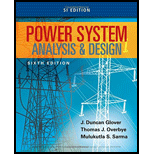
For the circuit element of Problem 2.3, calculate (a) the instantaneous power absorbed, (b) the real power (state whether it is delivered or absorbed). (c) the reactive power (state whether delivered or absorbed). (d) the power factor (state whether lagging or leading).
[Note: By convention the power factor
Want to see the full answer?
Check out a sample textbook solution
Chapter 2 Solutions
Power System Analysis & Design
- 8.4 Self-Bias Configuration 20. Determine Zi. Zo. and A,, for the network of Fig. 8.73 if gf, = 3000 μS and gos = 50 μs. 21. Determine Z, Zo, and A, for the network of Fig. 8.73 if the 20-uF capacitor is removed and the parameters of the network are the same as in Problem 20. Compare results with those of Problem 20. +12 V 3.3 ΚΩ HE C₂ Vo Z Zo C₁ 10 ΜΩ Z₁ 1.1 ΚΩ Cs 20 µF FIG. 8.73 Problems 20, 21, 22, and 59.arrow_forward21. Determine Zi, Zo, and A, for the network of Fig. 8.73 if the 20-μF capacitor is removed and the parameters of the network are the same as in Problem 20. Compare results with those of Problem 20. +12 V 3.3 ΚΩ +6 C₂ C₁ Z₁ 10 ΜΩ 1.1 ΚΩ Cs 20 μF FIG. 8.73 Zoarrow_forwardNinth Edition Determine Zi, Zo and Av 20 V Zi + 1 ΜΩ 2 ΚΩ HH Z IDSS= 6MA Vp=-6V Yos = 40μS 20 and 47arrow_forward
- What is the worst case time complexity of the following algorithm for i = 1 to x do for j = 2^((i-1)x) to 2^(in) do print(i,j)arrow_forwardProve for each pair of expression f(n) and g(n) whether f(n) is big O, little o Ω,ω or Θ of g(n). For each case it is possible that more than one of these conditions is satisfied:1. f(n) =log(n2^n), g(n) = log(sqrt(n)2^(n^2))2. f(n) =nsqrt(n) +log(n^n), g(n) =n + sqrt(n)lognarrow_forwardI need to make a parallel version of this sequential codearrow_forward
- I need to make a parallel version of this sequential code.arrow_forwardBenefits of using arrays as instance variables: What are the advantages of incorporating arrays as instance variables within a class? Initializing and managing arrays: How do you initialize and manage arrays within class constructors and mutators (setters)? Example of using arrays as instance variables: Share an example where you have used arrays as instance variables and discuss its application in a real-world scenario. Common mistakes with arrays as instance variables: What are some common mistakes to avoid when working with arrays as instance variables? Information hiding violations: What is the potential violation of information hiding when using arrays as instance variables? How can this be resolved?arrow_forwardDo you think that computers should replace teachers? Give three references with your answer.arrow_forward
- Is online learning or face to face learning better to teach students around the around the world? Give reasons for your answer and provide two references with your response. What are benefits of both online learning and face to face learning ? Give two references with your answer. How does online learning and face to face learning affects students around the world? Give two references with your answer.arrow_forwardExplain Five reasons if computers should replace teachers. Provide three references with your answer. List three advantages and three disadvantages face to face learning and online learning may have on children. Provide two references with your answer.arrow_forwardYou were requested to design IP addresses for the following network using the address block 10.10.10.0/24. Specify an address and net mask for each network and router interfacearrow_forward
 C++ for Engineers and ScientistsComputer ScienceISBN:9781133187844Author:Bronson, Gary J.Publisher:Course Technology Ptr
C++ for Engineers and ScientistsComputer ScienceISBN:9781133187844Author:Bronson, Gary J.Publisher:Course Technology Ptr Operations Research : Applications and AlgorithmsComputer ScienceISBN:9780534380588Author:Wayne L. WinstonPublisher:Brooks Cole
Operations Research : Applications and AlgorithmsComputer ScienceISBN:9780534380588Author:Wayne L. WinstonPublisher:Brooks Cole

